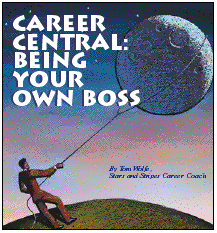TRENDS: Rollcall
An excerpt from Stars and Stripes
By Tom Wolfe,
Stars and Stripes Career Coach
Reprinted from The Stars and Stripes, April 6, 2001
 “What I would really like to do when I get out of the military is go into business for myself. Be my own boss. Control my own destiny. Sink or swim on my own merits."
“What I would really like to do when I get out of the military is go into business for myself. Be my own boss. Control my own destiny. Sink or swim on my own merits."
That's the response I recently received when I asked an Army major who was about to retire about his employment objective. I bet many of you have had similar thoughts at some time. Sounds good, doesn't it? Is self-employment right for you? Possibly.
Going into business for yourself offers many advantages. You get to call the shots; decide where you live; wear what you want to wear; associate with people and products you care about; set your own hours; hire and fire as needed, according to your standards; and reap the rewards of your success.
Considering the above, the appeal of self-employment is understandable. But let's take a look below the waterline.
Risk. According to the Small Business Administration, more than 70 percent of self-employment ventures fail in the first two years. Can you afford the risk?
Accountability. There will be a big scoreboard up there with your name on it, and the numbers next to your name will be your numbers. Nobody can take credit for your success and nobody will cover up your failures.
Financing/cash flow/credit. Starting a business requires seed money. Do you have it? If you have to borrow, how is your credit rating? Most franchising opportunities require an up-front investment between $5,000 and $40,000. Many business failures can be attributed to running out of cash in the first year.
Time off. How important is it? Have you been using that 30 days of annual leave that the military has provided? Having those federal holidays off is kind of nice. Guess what? Self-employment often means no vacation, no holidays and no weekends. This can be the case until your business is well-established and you have employees to whom you can comfortably hand the keys when you're out of town.
Working hours. Yes, your military experience has familiarized you with 12- to 14-hour days. Were you thinking about cutting back a little? Forget it! Being your own boss is 24/7!
Employees. Will you need them? As much as you relish the thought of not having a boss, do you really want to be one? If so, how many employees and what kind of talent will you need? Can you find them? Most businesses will tell you that their number one problem is finding and retaining good employees.
Preparation. While your management expertise may be impressive in personnel, administration and material resources, you have little or no business management experience. You are used to the bottom line called "readiness," but your success or failure in business will be based on "profit and loss."
Can you write a business plan – one that will pass muster with a lending officer or a franchiser? Have you taken an accounting course? You may need professional guidance from accountants and lawyers. Are those fees in your budget?
Paychecks. How much will you make? When you work for yourself, you pay yourself last. Pay your overhead, service your debt, pay your employees, give the federal, state and local governments their share and you get what's left.
Considering all of the above, why do people choose self-employment?
Independence, self-determination, the lifestyle associated with picking where you want to live, or perhaps working out of your home, the chance to earn a living by doing something you are passionate about are just a few of the reasons.
You should also consider your current status. Let's return to the Army major quoted at the beginning of this article.
He will soon retire with 22 years of service and receive a monthly pension. He and his wife are "empty nesters" now that their two children are no longer living at home. She has a degree in accounting and has worked outside the home throughout his career, mostly in retail sales and as an accounts payable/receivable clerk.
Other than a small credit card balance, the couple is debt-free. They have been able to save some money and have an excellent credit rating. In addition to being a self-proclaimed "motorhead," he spent most of his career, both as an enlisted man and an officer, in vehicle maintenance. This supports his interest in either opening a truck maintenance facility or becoming a franchisee for Jiffy Lube or Quick Lube.
His situation appears perfect for self-employment. How about yours? For additional guidance, I suggest the following resources:
©Stars and Stripes Omnimedia, www.stripes.com.
Table of Contents
[if:(cookie:'ID')=='']





